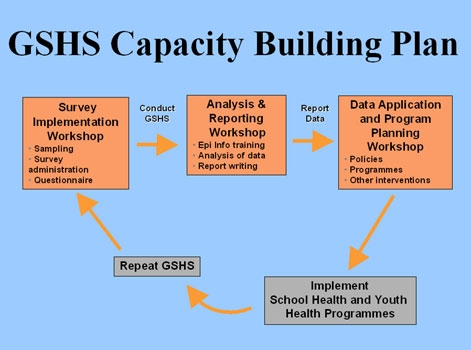Background
The purpose of the GSHS is to provide data on health behaviors and protective factors among students to
- Help countries develop priorities, establish programs, and advocate for resources for school health and youth health programs and policies;
- Allow international agencies, countries, and others to make comparisons across countries regarding the prevalence of health behaviors and protective factors; and
- Establish trends in the prevalence of health behaviors and protective factors by country for use in evaluating school health and youth health promotion.
GSHS Overview [PDF – 211 KB] Background information on GSHS purpose, methods, and country participation
GSHS data release and publication policies and procedures are based on the following guiding principles:
- GSHS data are owned by the official country-level agency (ex. Ministry of Health) conducting or sponsoring the survey.
- Public health and scientific advancement are best served by an open and timely exchange of data and data analyses.
- The privacy of participating schools and students must be protected.
- Data quality must be maintained.
The GSHS is a school-based survey conducted primarily among students aged 13–17 years. The GSHS uses a standardized scientific sample selection process; common school-based methodology; and core questionnaire modules, core-expanded questions, and country-specific questions that are combined to form a country-specific self-administered questionnaire which can be administered during one regular class period.
The 10 core questionnaire modules address the leading causes of morbidity and mortality among children and adults worldwide
- Alcohol use
- Dietary behaviors
- Drug use
- Hygiene
- Mental health
- Physical activity
- Protective factors
- Sexual behaviors related to HIV infection, other sexually-transmitted infections, and unintended pregnancy
- Tobacco use
- Violence and unintentional injury
- GSHS Data User’s Guide [PDF – 539 KB] Technical information about GSHS data files.
- Data Policy (English) [PDF – 48 KB] Information on data coordination, authorship, review, approval, acknowledgements, and access.
- Data Policy (French) [PDF – 47 KB] Information on data coordination, authorship, review, approval, acknowledgements, and access.

On-going capacity building and support is provided by WHO and CDC. Capacity building includes help with sample design and selection; training of survey coordinators; provision of survey implementation handbooks and other materials; provision and scanning of computer-scannable answer sheets; data editing and weighting; and provision/facilitation of funding and resources to assist countries.
Two workshops are provided to specially selected survey coordinators from each participating country. The Survey Implementation Workshop builds the capacity of survey coordinators to implement the survey in their country following common sampling and survey administration procedures that ensure the surveys are standardized and comparable across countries and that data are of the highest quality. The Data Analysis and Reports Workshop, conducted after the field work is complete, builds the capacity of survey coordinators to conduct data analysis and generate a country-specific report and fact sheet using Epi-Info software provided to them.